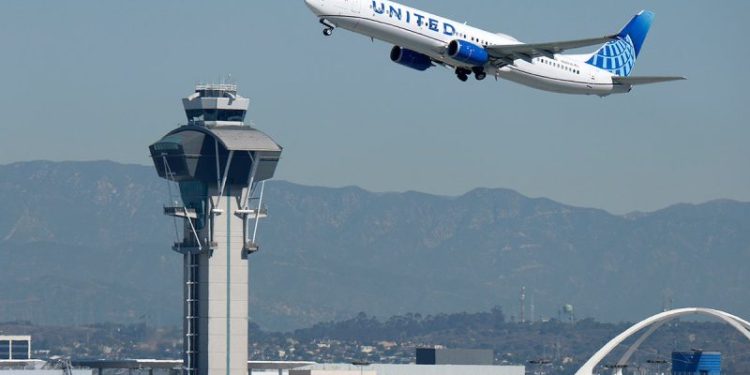The Federal Aviation Administration (FAA) started reducing air traffic across 40 airports Friday due to air traffic controller staffing issues stemming from the government shutdown.

As the government shutdown has hit 40 days, more air traffic control workers have refused to come to work as they’re about to miss a second paycheck next week — prompting the FAA to make cuts to ensure no safety issues arise.
But these flight reductions will likely continue if the shutdown does — or worsen — and could impact thousands of flights daily, according to Marc Scribner, a senior transportation policy analyst at the libertarian Reason Foundation think tank.
‘This would affect thousands of flights per day, and tens of thousands of passengers potentially seeing their flights canceled — a major disruption,’ Scribner told Fox News Digital Thursday.
As of Sunday, there are now enough Senate Democrats willing to back a revamped plan to reopen the government. But if the shutdown doesn’t end, air travel disruptions are at risk.
‘I don’t think we would expect, if the shutdown continues, for staffing levels to improve over what they are right now,’ Scribner said. ‘If anything, they will continue to deteriorate as controllers call out sick or perhaps even resign. So I would expect it would not get better as long as the shutdown continues.’
Scribner said that travelers shouldn’t be concerned that the reduction in flights would translate to a lapse in safety, but said they should be aware that their travel schedules will likely take a hit as a result.
‘They’re not going to allow unsafe flights. So whatever that means in terms of staffing capability and workflow, they are going to reduce the flights in order to maintain that very high level of safety that’s demanded of that,’ Scribner said. ‘Travelers shouldn’t be concerned about safety in this, but they should be concerned about their travel schedules, which are likely to be impacted.’
Richard Stern, director of the Grover M. Hermann Center for the Federal Budget at conservative think tank The Heritage Foundation, also said he expects this reduction to continue until the shutdown ends.
‘Unfortunately, I think it’s going to have to continue until the shutdown ends, because they’re running through resources that they don’t have until this funding again,’ Stern told Fox News Digital Thursday.
Stern said the government has been entering into uncharted territory now with what minimum services the government is required to provide, despite the fact that funding has expired.
‘No one really knows exactly what the next steps are after this,’ Stern said.
No clarity has been provided regarding how long this reduction in flights is expected to continue. The Department of Transportation, which oversees the FAA, did not immediately respond to a request for comment from Fox News Digital.
The FAA said Friday that air traffic will be cut by 10% in the coming days across 40 ‘high-volume’ markets, including those in major cities like Atlanta, Denver, Dallas, Orlando, Miami and San Francisco, according to a list of airports obtained by The Associated Press. Major metropolitan areas with several airports like New York and Chicago will have outages at multiple locations.
Reducing air traffic in response to the lapse in funding from the government shutdown is unprecedented, according to FAA Administrator Bryan Bedford.
‘I’m not aware in my 35-year history in the aviation market where we’ve had a situation where we’re taking these kinds of measures,’ Bedford said at a news conference Wednesday.
Air traffic controllers have been working without pay since the shutdown kicked off Oct. 1, and often are required to work six days a week in addition to mandatory overtime.
Bedford said that the decision to reduce air traffic was made in order to prevent a crisis from emerging, amid increased staffing pressures and voluntary safety reports from pilots suggesting that air traffic controllers were facing heightened levels of fatigue.
‘We’re not going to wait for a safety problem to truly manifest itself when the early indicators are telling us we can take action today to prevent things from deteriorating,’ Bedford said. ‘The system is extremely safe today and will be extremely safe tomorrow. If the pressures continue to build even after we take these measures, we’ll come back and take additional measures.’
The Associated Press contributed to this report.



